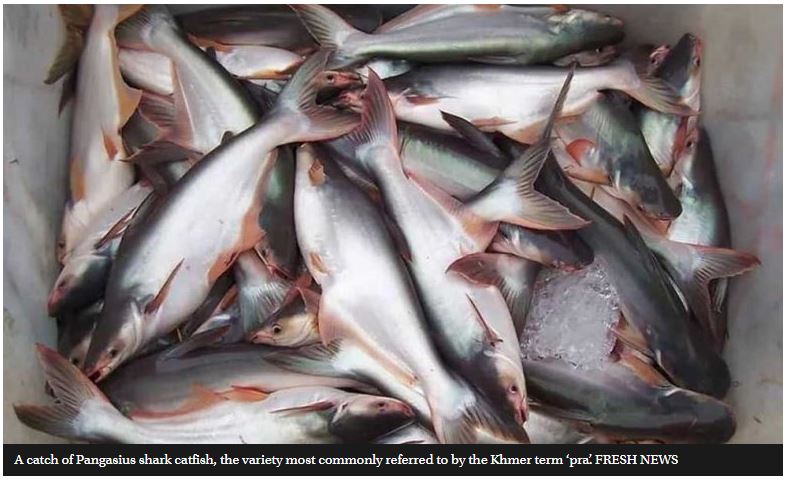China set to open gates for Cambodian ‘pra’ fish exports
China will import “pra” fish from Cambodia in the near future, once technical experts study and assess sanitary and other associated risks in virtual inspections and give the all-clear, Chinese ambassador to Cambodia Wang Wentian affirmed on December 6.
“Pra” in the Khmer language typically refers to Pangasius djambal, but could more widely describe shark catfish of genii such as Helicophagus, Pangasianodon and Pangasius. It was not immediately clear which specific species could be exported.
Speaking at the inauguration ceremony for National Road 11, Wang said the decision was motivated by an earlier virtual meeting between Prime Minister Hun Sen and his Chinese counterpart Li Keqiang.
The ambassador said that when the China-Cambodia Free Trade Agreement (CCFTA) and the Regional Comprehensive Economic Partnership (RCEP) enter into force, Beijing and Phnom Penh’s efforts to build a common destiny between the two countries would gain a burst of momentum.
On the occasion, Hun Sen also mentioned that he had asked China to buy more agricultural goods from Cambodia, with priority given to longan, and suggested the phytosanitary authorisation processing of more than one product at a time.
But Beijing’s response went above and beyond Phnom Penh’s request, agreeing to virtual inspections of both longan and “pra” fish, he said.
“Given that we Cambodians are rich in ‘pra’, entering the huge Chinese market will encourage breeding of the fish in the Kingdom … generating income for Cambodian farmers,” he said.
The prime minister expressed confidence in an uptick in fish farming, saying demand from markets such as China would buoy the hopes of Cambodian farmers.
Aquaculture associations and fish farmers alike welcomed the prospect of shipping “pra” fish to China, a top market for Cambodian agricultural goods, but voiced concern over a range of issues such as quality, safety and other relevant standards, quantity requirements and prices.
Cambodian Aquaculturist Association (CAA) president Sok Raden told The Post that an early start to “pra” fish exports to China would be a boon for the Kingdom, especially the farmers, but challenges concerning the cost of raising the shark catfish remain.
He noted that a sizeable share of juvenile fish and feed are imported, which drive up production costs and hurts the competitivity of the product.
“But I believe the government is already contemplating on how to attract investors to set up fish feed factories in Cambodia, lending farmers a wider window for ramping up production and reaching profitability,” Raden said.
Similarly, Cambodia Safe Fish, Meat and Vegetables Association vice-president Sok Yorn chalked up the decision as a win for farmers, but noted that most are a bit out of the loop when it comes to the techniques needed to raise “pra” fish to the desired standards.
“Exports require quality, safety and hygiene. But in our country today, farming techniques are still quite primitive and additional training would be required to the plan to ship to China to go smoothly,” he said.
Sovann, the owner of a family-run “pra” fish farm in southeastern Kampong Thom’s Santuk district, stressed that, given the daunting production costs, special policies to help farmers export at economically-viable, competitive rates would be needed.
“Regarding raising ‘pra’ fish nowadays, we face loads of difficulties when it comes to exports, because most Cambodian farmers spend so much money on raising them, on account that almost 100 per cent of the feed and juvenile fish are brought in from Vietnam.”
According to Sovann, the price of locally-raised “pra” fish has dropped from 5,000 riel ($1.23) to just over than 4,000 riel per kilogramme during Covid.
Source: https://www.phnompenhpost.com/business/china-set-open-gates-cambodian-pra-fish-exports


 Thailand
Thailand




